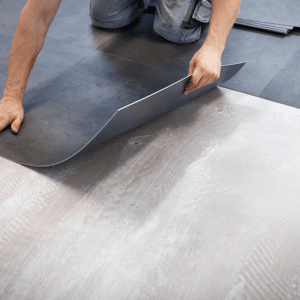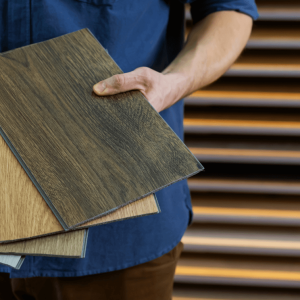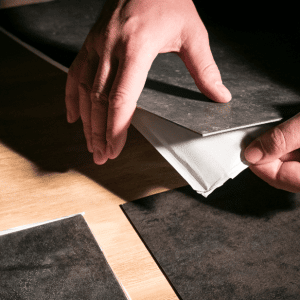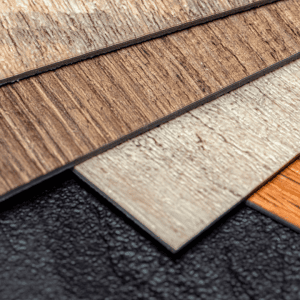Vinyl flooring is many things, among them low-maintenance, cost-effective, long-lasting, highly-customizable, and water resistant. As such, it’s little surprise why vinyl is the most popular type of resilient flooring.
That said, while vinyl can mimic a lot of materials insofar as how it looks, you’ll never be fooled into thinking it’s anything other than vinyl. It likely also won’t do anything to increase your home value. There are definite benefits to vinyl, but that doesn’t necessarily mean it’s right for you.
Argument for Vinyl Flooring: Easy to install
It used to be available in large unwieldy sheets, but DIYers spoke and the industry listened, making vinyl available in planks or tiles. In fact, many luxury vinyl brands have self-adhesive vinyl available, allowing it to be applied to a prepared subfloor once the backing has been removed.
Argument against: Hard to remove
The adhesive, once hardened, is meant to stay put. It can be very difficult to remove vinyl once installed. While you won’t necessarily need a professional to do the job for you, you will need to be prepared to spend a lot of time and elbow grease to do it yourself.
Argument for Vinyl Flooring: Easy on the wallet
If you’re looking at upfront cost, vinyl is going to beat the alternatives hands down. It runs typically between $2 to $5 per square foot with installation included. Sheet vinyl is the cheapest, so if cost is a significant factor, keep that in mind. However, there will be more involved as it will need to be measured and cut.
Comparatively, wood flooring can cost $10 PSF. Vinyl is also easy to maintain and keep clean, making it an attractive alternative.
Argument against: You get what you pay for
While there is a large amount of vinyl to choose from, the quality isn’t always reliable or consistent. The thicker the vinyl, the harder it will be to damage or indent with furniture. You may not need the same quality of vinyl in all areas of the house, but for high-traffic areas, you’ll want “rigid core” vinyl, which maximizes stability and endurance with four layers of material.
If you’re going to install vinyl floors, we recommend sticking to brands with a proven track record of product excellence, like Classic Wood Floor manufacturer Hallmark Floors.
 Argument for Vinyl Flooring: The sky’s the limit
Argument for Vinyl Flooring: The sky’s the limit
As we mentioned, vinyl flooring can aesthetically mimic a number of materials. Find stunning or uncommon patterns, or stick to the classics like distressed wood, stone, marble, and ceramic. The world really is your oyster when it comes to choosing what you want your home to look like.
Argument against: Does little for resale value
Unlike authentic wood flooring, your vinyl floors are likely not going to add value to your home. This may or may not be a significant consideration, depending on your long-term plans for your home. If you’re living in your forever home, things like resale value may not matter as much. However, if you’re looking to profit on your investment, it’s probably better to look for something with more inherent value.
If you have purchased a home with vinyl flooring, there are other considerations. Any vinyl produced during the 1980s or earlier is likely to have been made with asbestos. Asbestos has been famously linked to a slew of health issues, including cancer, making it a dangerous material. You can find out if asbestos is present with a simple at-home test, or by calling a professional.
A vinyl floor made with asbestos can and should be left alone if it’s in good condition—that is, not cracked and no surface scoring. Unless, of course, you wish to replace it. In this case, a professional must remove your flooring.
Bottom-line: Should I get vinyl floors?
Ultimately, the decision on what sort of flooring material best suits you will depend on your specific circumstances. For many people, vinyl is a sturdy, easy-to-maintain flooring option that adds character to the home without requiring a lot of upfront cost.
Ask yourself what you want out of your home. Factor in those you live with—spouses, children, pets, and the sort of flooring that you need for those high traffic areas. And as always, call Classic Wood Flooring with any questions. We’ll help you find the flooring that’s right for you and your household.
